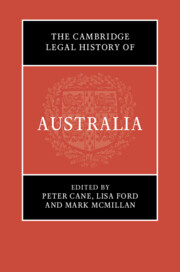Book contents
- The Cambridge Legal History of Australia
- The Cambridge Legal History of Australia
- Copyright page
- Contents
- Figures
- Maps
- Contributors
- Maps
- 1 Editors’ Introduction
- I Cultures of Law
- II Public Authority
- 5 Colonial Settlement to Colony
- 6 Colonial Self-government
- 7 Federation
- 8 Constitutionalism in Australia
- 9 Indigenous Governance
- III Public Authorities in Encounter
- IV Land and Environment
- V Social Organisation
- VI Social Ordering
- VII Reckonings
- Index
9 - Indigenous Governance
from II - Public Authority
Published online by Cambridge University Press: 04 August 2022
- The Cambridge Legal History of Australia
- The Cambridge Legal History of Australia
- Copyright page
- Contents
- Figures
- Maps
- Contributors
- Maps
- 1 Editors’ Introduction
- I Cultures of Law
- II Public Authority
- 5 Colonial Settlement to Colony
- 6 Colonial Self-government
- 7 Federation
- 8 Constitutionalism in Australia
- 9 Indigenous Governance
- III Public Authorities in Encounter
- IV Land and Environment
- V Social Organisation
- VI Social Ordering
- VII Reckonings
- Index
Summary
Chapters 9.1 (by Tim Rowse and Jennifer Green) and 9.2 (by Daryle Rigney, Denis Rose, Alison Vivian, Miriam Jorgensen, Steve Hemming and Shaun Berg) present case studies of past and present of Indigenous governance. In 9.1 Rowse and Green show that Arrernte jurisdiction has persisted in certain ways in Alice Springs/Mparntwe since the 1870s, notwithstanding the colonists’ expectation – at least until the reforms of ‘welfare colonialism’ in the 1970s – that ‘detribalisation’ was rapidly and inevitably extinguishing customary law. Their chapter outlines some episodes of recognition that have arisen from the overlapping of two systems of law in a space inhabited by both Arrernte and non-Arrernte people. The first example discussed is the acknowledgement and protection of sacred sites, and the second the decreasing accommodation of customary law within the criminal law. In 9.2 Rigney et al explore the experiences of two Aboriginal nations, the Gunditjmara People and the Ngarrindjeri Nation, asserting their status as distinct peoples and, in so doing, demonstrating their capacity to achieve their Indigenous Nation Building goals. While both face significant challenges in establishing Indigenous self-governing systems and accommodating them within the Australian federation, their intention to self-govern according to Gunditjmara and Ngarrindjeri norms is indisputable.
- Type
- Chapter
- Information
- The Cambridge Legal History of Australia , pp. 186 - 224Publisher: Cambridge University PressPrint publication year: 2022



